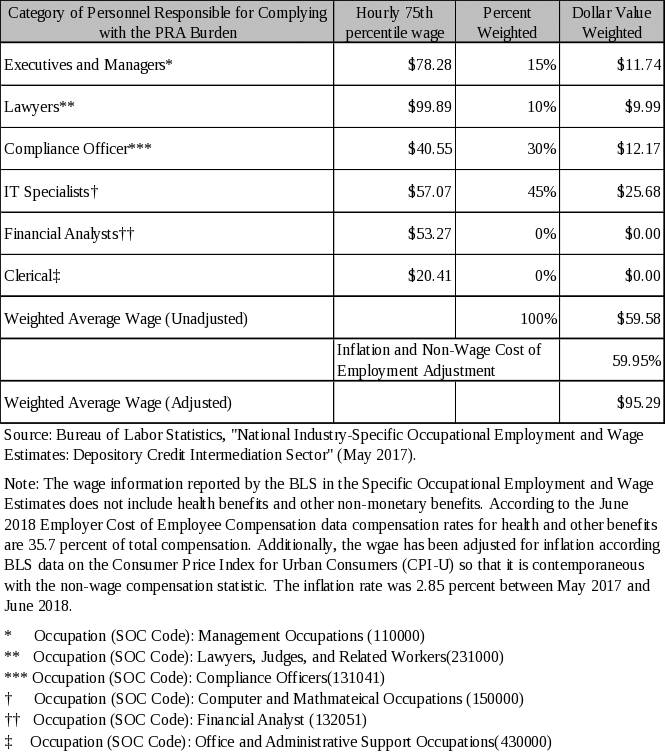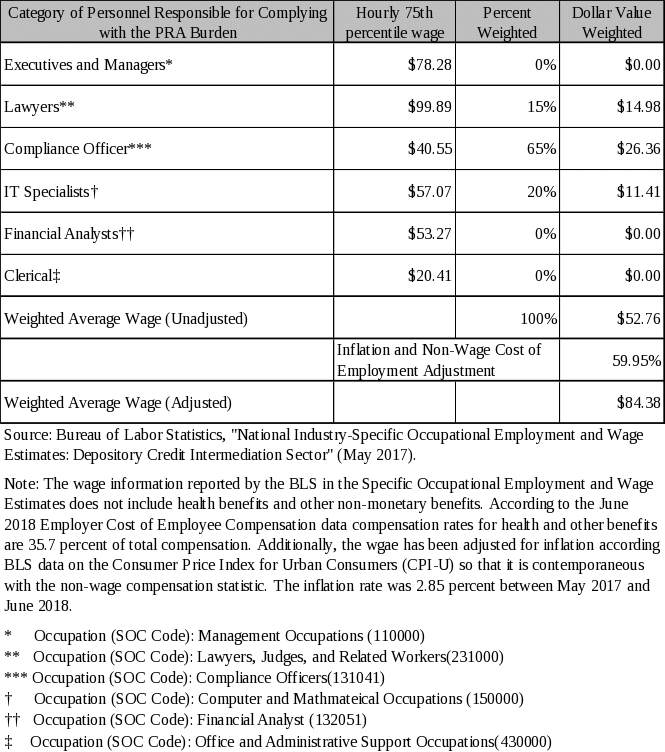SPST-0161 - Procedures to Enhance the Accuracy and Integrity of Information Furnished to Consumer Agencies (2019) - 2-27-19
SPST-0161 - Procedures to Enhance the Accuracy and Integrity of Information Furnished to Consumer Agencies (2019) - 2-27-19.doc
Furnisher Information Accuracy and Integrity (FACTA 312)
OMB: 3064-0161
SUPPORTING STATEMENT
Furnisher Information Accuracy and Integrity (FACTA 312)
(OMB Control No. 3064-0161)
INTRODUCTION
The Federal Deposit Insurance Corporation (FDIC) is requesting a three-year renewal of the information collection for its collection (3064-0161) associated with privacy of consumer financial information. The current clearance for the collection expires on February 28, 2019. There is no change in the method or substance of the collection.
JUSTIFICATION
Circumstances that make the collection necessary:
The Federal Deposit Insurance Corporation, the Board of Governors of the Federal Reserve System, the Office of the Comptroller of the Currency, the Office of Thrift Supervision (OTS), the National Credit Union Administration, and the Federal Trade Commission, (Agencies) were required by section 312 of the Fair and Accurate Credit Transactions Act of 2003 (FACT Act) to issue guidelines for use by furnishers regarding the accuracy and integrity of the information about consumers that they furnish to consumer reporting agencies and prescribe regulations requiring furnishers to establish reasonable policies and procedures for implementing the guidelines. Section 312 also required the Agencies to issue regulations identifying the circumstances under which a furnisher must reinvestigate disputes about the accuracy of information contained in a consumer report based on a direct request from a consumer. The regulations covering this information collection are contained in Regulation V of the Consumer Financial Protection Bureau’s regulations, Fair Credit Reporting, 12 CFR Section 1022. The FDIC examines for compliance with Regulation V and takes enforcement action when warranted.
Use of the information:
Section 1022.42(a) requires furnishers to establish and implement reasonable written policies and procedures regarding the accuracy and integrity of information relating to consumers that they provide to a consumer reporting agency (CRA). This rule requires furnishers to put into writing policies and procedures that address their section 312 responsibilities regarding the accuracy and integrity of information. Furnishers’ accuracy and integrity policies and procedures may include their existing policies and procedures that are reasonable and appropriate.
Section 1022.43(a) permits consumers to initiate disputes directly with the furnishers. This gave consumers a new way to dispute consumer report information; instead of having to go through a CRA as permitted by the Fair Credit Reporting Act, consumers now have the right to go directly to the furnisher in certain circumstances. Under the rule, furnishers have to follow a process substantially similar to what they currently use for handling disputes submitted through a CRA. Furnishers need to amend their procedures to ensure that disputes received directly from consumers are handled in a substantially similar manner to the CRA dispute process.
Section 1022.43(f)(2) incorporates the statutory requirement that a furnisher must notify a consumer by mail or other means (if authorized by the consumer) not later than five business days after making a determination that a dispute is frivolous or irrelevant. Section 1022.43(f)(3) incorporates the statute’s content requirements for the notices.
Consideration of the use of improved information technology:
Financial institutions may adopt any existing technology relevant to producing or delivering the information.
Effort to identify duplication:
The collections of information are unique and cover the institution’s particular circumstances. No duplication exists.
Methods used to minimize burden if the collection has a significant impact on a substantial number of small entities:
The information collections do not impose any significant burden beyond that required by the statute. Because of the statutory requirements, there are no significant alternatives that minimize burden on small institutions.
This collection has a significant impact on a substantial number of small entities. In particular, according to Call Report data as of September 30, 2018, there were 3,533 FDIC-supervised institutions. 2,726 of these entities have total assets of less than $550 million therefore meeting the Small Business Administration’s definition of a “small entity.”
Consequences to the Federal program if the collection were conducted less frequently:
Without this information, the Agencies would be unable to meet the requirements of the statute.
Special circumstances necessitating collection inconsistent with 5 CFR 1320.5(d)(2):
None. This information collection is conducted in accordance with the guidelines in 5 CFR 1320.5(d)(2).
Efforts to consult with persons outside the agency:
A 60-day Federal Register notice seeking public comment was published on November 27, 2018 (83 FR 60862). No comments were received.
Payment or gift to respondents:
None.
Any assurance of confidentiality:
Information collected is kept private to the extent allowed by law. All required records are subject to the confidentiality requirements of the Privacy Act. In addition, any information deemed to be of a confidential nature is exempt from public disclosure in accordance with the provisions of the Freedom of Information Act (5 U.S.C. 552).
Justification for questions of a sensitive nature:
No questions of a sensitive nature are included in the collection.
Estimate of Hour Burden Including Annualized Hourly Costs:
Summary of Annual Burden and Internal Cost |
|||||||||
Information Collection (IC) Description |
Type of Burden |
Obligation to Respond |
Estimated Number of Respondents |
Estimated Frequency of Responses |
Estimated Time per Response |
Frequency of Response |
Total Annual Estimated Burden |
Labor Cost Per Hourly Burden |
Total Cost of Estimated Annual Burden |
Procedures to Enhance the Accuracy and Integrity of Information furnished to Consumer Reporting Agencies Under Section 312 of the Fair and Accurate Credit Transaction Act |
Reporting |
Mandatory |
3,533 |
1 |
40 hours |
Annually |
141,320 |
$95.29 |
$13,466,383 |
Distribution of Notices in Response to Direct Disputes |
Third-Party Disclosure |
Mandatory |
3,533 |
20 |
14 minutes |
On Occasion |
16,487 |
$84.38 |
$1,391,173 |
TOTAL HOURLY BURDEN |
157,807 hours |
|
|
|
|
|
|
|
|
TOTAL INTERNAL COST |
$14,857,556 |
|
|
|
|
|
|
|
|
The estimated labor cost1 is $14,857,556 and is based on the following:
Table 1: Procedures to Enhance the Accuracy and Integrity of Information furnished to Consumer Reporting Agencies Under Section 312 of the Fair Accurate Credit Transaction Act

Table 2: Distribution of Notices in Response to Direct Disputes

Estimate of Start-up Costs to Respondents:
None.
Estimate of annualized costs to the government:
None.
Analysis of change in burden:
There is no change in the method or substance of the collection. The overall 21,619 decrease in burden hours is the result of economic fluctuation. In particular, the number of respondents has decreased while the hours per responses have remained the same.
Information regarding collections whose results are planned to be published for
statistical use:
The results of this collection will not be published for statistical use.
Display of Expiration Date
This information collection is contained in a regulation.
Exceptions to Certification Statement
None.
STATISTICAL METHODS
Statistical methods are not employed in these collections.
1 The wage estimate associated with the labor hours necessary to comply with the information collection has been updated to more accurately represent current labor costs. The 2015 supporting statement uses a weighted average of four occupations/categories to estimate the cost burden: Compliance Admin/Analyst Staff (30%), Management /IT and Technical (45%), Senior Management (15%), and Legal Counsel (10%). However, the estimates do not include source information for the actual wage estimates for each of the categories. Thus, the estimates have been updated with data gathered from the Bureau of Labor Statistics (BLS).
| File Type | application/msword |
| File Modified | 2019-02-27 |
| File Created | 2019-02-27 |
© 2026 OMB.report | Privacy Policy